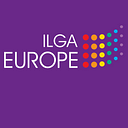Rainbow Europe Map shows countries pushing forward with LGBTI rights as democracy is confronted
Our brand new Rainbow Map shows steps forward in LGBTI rights in several countries, spelling out that equality is at the core of democracy in Europe. But while some are pushing forward, others continue to instrumentalise LGBTI discrimination to erode freedom.

ILGA-Europe’s 2022 Rainbow Map, which ranks the legal and policy situation of LGBTI people in 49 countries, shows that a new dynamic has appeared in the last 12 months to fill in the gaps that exist around LGBTI equality, and push standards at a time when democracy in the region is being challenged.
After several years reporting a disturbing standstill on LGBTI rights, the latest Rainbow Europe Map and Index identifies steps forward in LGBTI rights in several countries, with the clear understanding that equality and freedom for all are at the core of democracy. But while some are pushing forward, others continue to exploit anti-LGBTI sentiment as part of an agenda to erode freedom and equality.
Here are some examples of this positive movement for LGBTI rights across Europe:
- Denmark is taking the lead in filling in anti-discrimination gaps in current legislation, including the equal treatment law, which covers health, education, employment, provision of goods and services, and the penal code to include sexual orientation, gender identity, gender expression and sex characteristics (SOGIESC) as aggravating factors in hate crime.
- Iceland has legally recognised trans parenthood.
- Germany has introduced a ban on intersex genital mutilation.
- France banned so-called ‘conversion therapy’ based on sexual orientation and gender identity.
- There is positive legislative movement in Greece, Latvia, Lithuania, Serbia, Slovakia, and Slovenia, countering the narrative that there is an East/West divide on LGBTI rights in Europe, providing governments in these countries with strong opportunities to underpin democracy through adoption and implementation.
But it’s not all good news. Here are the countries sliding backwards on LGBTI rights:
Some countries that once were leading lights on LGBTI rights are slipping down the ladder, while others are in danger of following the precedent of countries where LGBTI rights are being instrumentalised for political gain.
- The United Kingdom has suffered a significant drop in ranking, going from 10th to 14th place, losing points as evidence was brought forward this year that the equality body is not, as set out in its mandate, effectively protecting on the grounds of sexual orientation and gender identity. This comes at a time of widespread political and media anti-trans sentiment, while the British government is not moving on long-promised reforms on gender recognition and banning so-called ‘conversion therapy’ for all.
- Bulgaria and Romania are now not far off the lowest ranking in the EU, which currently belongs to Poland. All three countries are witnessing a rise of official anti-LGBTI sentiment.
- A stark example of this is Romania losing points due to authorities’ obstruction of freedom of assembly by banning and punishing Pride events.
- Meanwhile, Hungary moved down three places, mainly because in 2021 its parliament adopted a ban on the “portrayal and the promotion of gender identity different from sex at birth, the change of sex and homosexuality” for persons under 18.
- In nearly half of the countries ranked, LGBTI people are not adequately protected against discrimination and violence for LGBTI people. 20 countries out of 49 still have no protection against hate crime based on sexual orientation, while 28 countries have no protection against violence based on gender identity.
A few words on Ukraine
It is worth mentioning that in Ukraine, before the Russian invasion, there was cautious optimism from LGBTI activists about the way forward, as seen in our Annual Review. Several politicians were willing to discuss legislative rights. Post-war this should provide the country with a bedrock on which to build a legislative framework that protects all its citizens, and a society that values LGBTI people as part of its democratic composition.
The LGBTI movement is evolving and so it is our Rainbow Map
The ILGA-Europe Rainbow Map ranks 49 countries in Europe on a scale between 0% (gross violations of human rights, discrimination) and 100% (respect of human rights, full equality). This year’s map also tells the story of an evolving movement. A brand-new category, “Intersex bodily integrity,” has been introduced. This is because for our movement in Europe, equality and non-discrimination laws, legal gender recognition, bodily integrity, protection from hatred and violence, family rights, and protection of asylum seekers are all interconnected and equally essential for the full enjoyment of human rights for LGBTI people.

